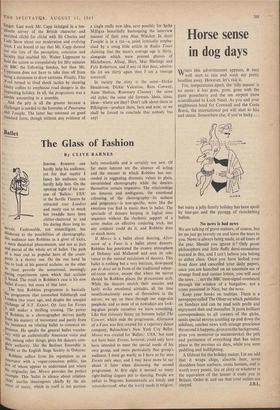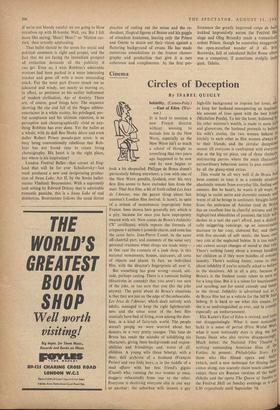Ballet
The Glass of Fashion
By CLIVE BARNES JEROME ROBBINS can hardly help his audience, yet for that matter I fancy his audience can hardly help him. On the opening night of his sea- son of 'Ballets: USA' at the Saville Theatre he attracted tout Londres and rarely can so much hot twaddle have been chitter-chattered to and fro during three long in- tervals. Fashionable, not uniutelligent, but blinkered to the possibilities of choreography, this audience sees Robbins as a giver of kicks, a mere theatrical phenomenon, and not as part and parcel of the whole art of ballet. The path of a man cast as popular hero of the avant- garde is a thorny one. On the one hand he has to look at his general acclaim; on the other ue must provide the sensational, seemingly daring experiments upon which that acclaim is based. The result in Robbins's case is his new ballet Events, but more of that later.
The first Robbins programme is basically the programme that astonished Edinburgh and London two years ago, and despite the unequal exchange of N.Y. Export, Op. Jazz for Events 't still makes a thrilling evening. The power of Robbins as a choreographer derives partly from his mastery of movement and partly from his insistence on relating ballet to common ex- rience. He speaks the general ballet vocabu- lary with an authentically American voice and this, among other things, gives his dancers com- plete authority, like the Berliner Ensemble in Brecht or the English Stage Society in Osborne.
Robbins suffers from his reputation as an Innovator with a vogue-conscious public, too few of whom appear to understand just where originality lies. Moves provides the perfect example. This 'ballet in silence about relation- ships' startles theatregoers chiefly by the ab- sence of music, which in itself is not particu- larly remarkable and is certainly not new. Of far more interest are the absence of acting and the manner in which Robbins has suc- ceeded in suggesting dramatic values to plain, unvarnished choreography while the dancers themselves remain impassive. The relationships are tenuous and ambiguous, the emotional colouring of the choreography—its sadness and poignancy—is non-specific, more like the emotions you find in music than in ballet. The spectacle of dancers keeping in logical time sequence without the rhythmic support of a score makes an effective conjuring trick, but any conjurer could do it, and Robbins does so much more.
If Moves is a ballet about dancing, After- noon of a Faun is a ballet about dancers. Robbins has penetrated the steamy atmosphere of Debussy and Mallarmi and seen its rele- vance to the natural narcissism of dancers. This ballet is nothing but a very intricate, slow-paced pas de deux set in front of the traditional rehear- sal-room mirror, except that where the mirror should be Robbins places the proscenium arch. While the dancers stretch their muscles and lazily strike emotional attitudes. all the time unselfconsciously aware of themselves in the mirror, we spy on them through our stage-size peephole, and as most of us nowadays are look- ing-glass people ourselves we learn something. Like that riotously funny yo humane ballet The Concert, which ends the programme, Afternoon of a Faun was first created for a repertory dance company, Balanchine's New York City Ballet. Moves was created for 'Ballets: USA,' but need not have been. Events, however, could only have been intended to meet the special needs of his own group, and more particularly that group's audience. I must go warily as I have so far seen Events only once, and I may have more to say about it later when discussing the second programme. At first sight it seemed so many right-feeling slogans put to dancing. People are unfair to Negroes; homosexuals are lonely and misunderstood; what the world needs is religion; if we're not bloody careful we are going to blow ourselves up with H-bombs. Well, yes. But I felt more like saying, 'Hear! Hear!' or 'Motion car- ried,' than actually applauding.
That ballet should be the arena for social and political comment is right and proper, and the fact that we are facing the immediate prospect of extinction demands all the publicity it can get. Even so, I wish Robbins's admirable mottoes had been packed in a more interesting cracker and gone off with a more resounding crack. For the most part Events struck me as laboured and windy, not nearly so moving or, in effect, so pertinent as his earlier indictment of modern civilisation, Age of Anxiety. There are, of course, good things here. The sequence showing the rise and fall of the Negro athlete- entertainer in a white society, his privileged, par- tial acceptance and his ultimate rejection, is as perceptive and choreographically vivid as any- thing Robbins has ever done. Yet the ballet as a whole, with its dull Ben Shahn decor and even duller Robert Prince pseudo-jazz score, is so busy being conventionally rebellious that Rob- bins has not found time to create living choreography. His heart is in the right place, but where is his inspiration?
London Festival Ballet—that corner of Eng- land that will be for ever Tchaikovsky—last week produced a new and invigorating produc- tion of Swan Lake, Act II, by the Soviet ballet- master Vladimir Bourmeister. With a supremely lush setting by Edward Delany that is admirable romantic pastiche, this is a Swan Lake of real distinction. Bourmeister follows the usual Soviet practice of cutting out the mime and the re- dundant, illogical figures of Benno and his gaggle of attendant huntsmen, leaving only the Prince and Odette to dance out their vision against a fluttering background of swans. He has made numerous emendations to the Ivanov choreo- graphy and production that give it a rare coherence and completeness. At the first per- formance the greatly improved corps de ball trekked impressively across the Festival Ha stage and Oleg Briansky made a romanticall ardent Prince, though he somewhat exaggerate the open-mouthed wonder of it all. In Borowska, full of calculated Ballet Busse allur was a competent, if sometimes stodgily jnel gant, Odette.































 Previous page
Previous page